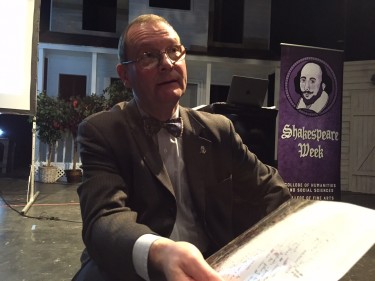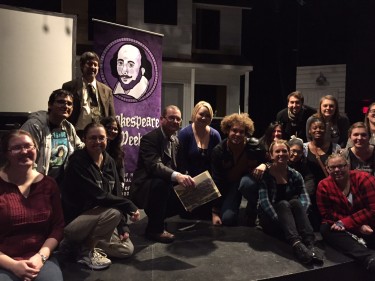Story and photos by Laurie Merrill
GCU News Bureau
William Shakespeare didn’t have the luxury of computers, cinematic flashbacks, voice-overs or any of today’s high-tech storytelling devices when he was writing 400 years ago. He was dipping quill in ink long before movies, TV and radio became commonplace, in an era predating computers, typewriters, even ballpoint pens.
Yet, in his London, thousands of spectators packed public theaters, many crushed together in standing-room-only spaces, to laugh and cry through some of the most vividly told comedies and tragedies of all time.
On Wednesday, as part of Grand Canyon University's weeklong celebration honoring the 400th anniversary of the playwright’s death, guest lecturer and acknowledged Shakespeare expert Dr. Paul Hartle lectured on how the bard created elaborate settings — using only his words.
“Imagination produces the landscape,” Hartle, of St Catharine’s College at the University of Cambridge, told a rapt audience of 200 students, faculty and staff in Ethington Theatre.
How the Bard of Avon presented his work
Shakespeare’s Globe Theatre, built in 1599, was a three-story, open-air amphitheater that seated 3,000 people. The stage, a wooden rectangle in the yard, signified “earth.” At the rear, a ceiling adorned with paintings and supported by columns conveyed “heaven,” while the dark space under the stage symbolized “death.”
Yet Shakespearean scenes took place in palaces, graveyards, sailing ships and battlefields, atop cliffs and astride horses, in cultured European cities and in magical forests.
What made those various scenes delivered in one setting believable were Shakespeare’s descriptions, the words with which he wove images in the imaginations of the theatergoers.
For example, in Act 3, Scene 2 of "King Lear," there can be little doubt about whether the central character is inside or out, and what the weather was like.
King Lear:
"Blow, winds, and crack your cheeks! Rage! Blow!
You cataracts and hurricanoes, spout
Till you have drench'd our steeples, drown'd the cocks!
You sulphurous and thought-executing fires,
Vaunt-couriers to oak-cleaving thunderbolts,
Singe my white head! And thou, all-shaking thunder,
Smite flat the thick rotundity o' the world!"
In Act 4, Scene 6, Edgar is convincing Gloucester that the two are on the edge of a cliff, though they are not.
Edgar:
"Come on, sir. This is the place. Stand still.
It’s so scary to look down! It makes me dizzy.
The crows flying down below look as small as ants.
Halfway down the cliff there’s somebody clinging to the rock and gathering wild herbs — a risky business!
He looks like a dot to me.
The fishermen walking along the beach are as small as mice.
That big ship over there looks no bigger."
Edgar and Gloucester are not on a cliff, they are on a wooden stage. It’s the lines they are reciting that turn a stage into something else altogether, Hartle said. “This brilliant construct of a scene is entirely imaginative,” he said.
Shakespeare’s scenery can portray different meanings, such as the forest of Arden, which has been described as both bucolic and innocent and as a sinister wasteland, Hartle said.
“Arden was a shape-shifting, metamorphosing place,” he said.
Hartle’s talk was entitled, “I, now am I in Arden, the more foole I,” from "As You Like It," and the theme was “Shakespeare’s Imagined Landscapes.”
He gave a second presentation Wednesday titled "Shakespeare Mashups—Adapting Shakespeare for Today’s Young Audience."
More fascinating facts can be found in the recent blog “'To Be, or Not to Be?' Celebrating 400 Years of Shakespeare,'' by Dr. Meredith DeCosta of the College of Education, Michael Kary of the College of Fine Arts and Production and Dr. James Helfers of the College of Humanities and Social Sciences.
Contact Laurie Merrill at (602) 639-6511 or [email protected].

















